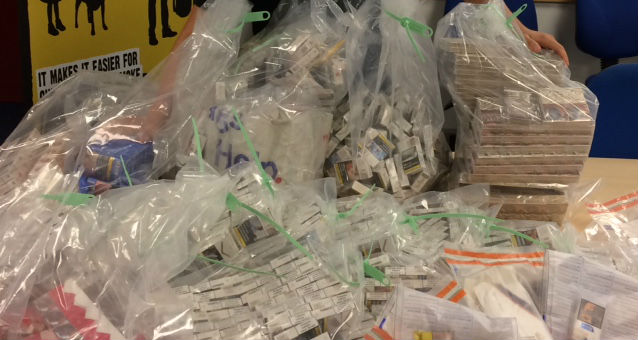The report, which was commissioned by cigarette manufacturer Philip Morris, said that Yorkshire and the Humber was the second worst region for illicit sales.
Illegal cigarettes are a big issue for the tobacco business. The KPMG report says that although cigarette consumption in the UK was down 7% to 30.6bn in 2020 compared to 2019, the proportion of contraband cigarettes was up.
It rose 17.1% to 5.2bn, with £2.2bn lost tax revenue as a result.
The KPMG report says a growing proportion of counterfeit cigarettes are made in illegal factories within the European Union.
Organised criminal groups continued to move their operations inside the EU borders.
Convenience store operators who sell illegal cigarettes have regularly been prosecuted, with some going to jail.
As lockdown restrictions have eased over the past few months, Philip Morris has resumed sending teams across the UK to gather intelligence that assist local authorities and law enforcement with their efforts to clamp down on illegal trade.
Cem Uzundal, head of field force sales from Philip Morris Limited, said: “To increase profits, illegal tobacco is produced with cheap materials, and with little regard for health and quality controls.
“Seized counterfeit cigarettes have been found to containing mites, insect eggs, fungi and even faeces.
“Illicit products are also completely unnecessary. Smoke-free alternatives are widely available to legal-age smokers, such as heated tobacco products, which are both affordable and less harmful than continued smoking.”
Philip Morris is offering millions of pounds to back schemes which fight this illegal trade, including illicit tobacco products.
The company’s PMI Impact scheme offers financial backing to initiatives which help prevent illegal trade by “aiming to counter its negative consequences for individuals, their families and communities”.
In its latest funding round the multi-national, whose products include Marlboro cigarettes, has set deadlines of 15 February and 15 August 2022 for schemes interested in the funding.
Since its launch in 2016, PMI Impact has given £34m to 60 projects worldwide.
The fund asks for applications from both public and private or non-profit organizations, including government bodies, international groups and academic institutions.
 Talking Retail Grocery and product news for independent retailers
Talking Retail Grocery and product news for independent retailers






